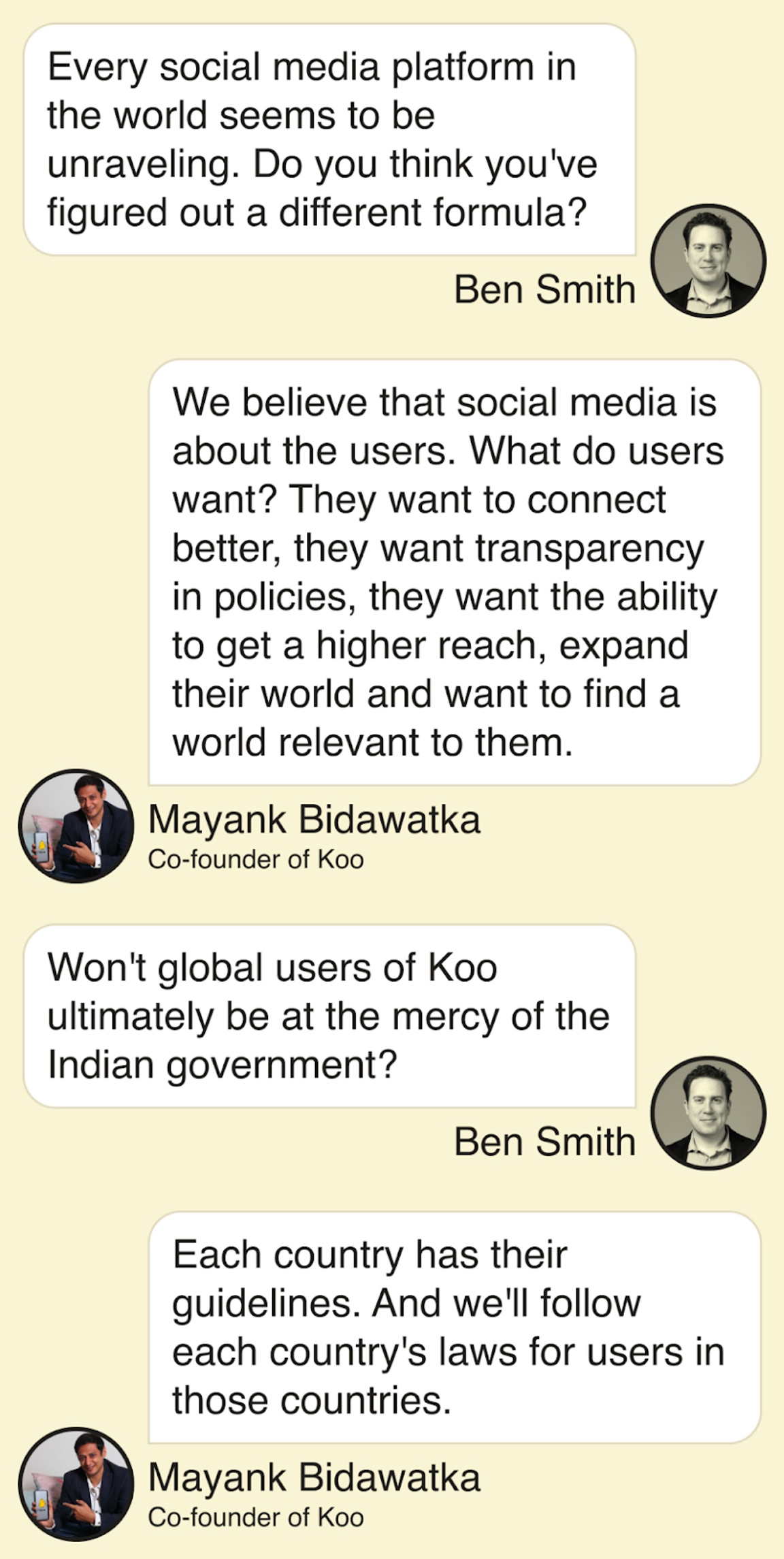 Nellie Bowles Nellie BowlesTHE NEWS Last Monday, Bari Weiss asked me what my angle was in writing about her. I told her I wondered whether, showered with adulation, investment, and information from Elon Musk and his allies, her new media company The Free Press could be truly independent. She was basking in the flood of attention and subscriptions that came with the Twitter owner’s invitation to nose around the company’s internal documents. But over the course of the week, she raised one of the most uncomfortable questions for Musk: Whether Tesla’s operations in China will affect Twitter’s speech policies. Then on Friday, after Musk had suspended the accounts of several journalists, she criticized his pattern of running Twitter by “whims and biases.” “You asked me the other day if I was going to be afraid to bite the hand that feeds me,” Weiss told me Friday. “That’s just never been a problem to me. My entire career has been a testament to that.” BEN’S VIEW Musk responded to Weiss’s criticism by accusing her of “virtue-signaling to show that you are ‘good’ in the eyes of media elite to keep one foot in both worlds,” which made Weiss laugh: “The idea that i would be trying to please that crowd of people is not only impossible, it would be delusional of me.” But Musk, who then unfollowed Weiss on Twitter, has a point of sorts. Weiss does want to have it both ways: To capture the energy of hyper-polarized social media, while delivering something she hopes will be independent and nuanced. “The risk for me is entirely clear,” she told me Friday, when I asked her why she’d decided to build a publication, rather than simply cashing in on her personal brand. “Am I going to be the anti-woke cancel culture girl and feed my audience that kind of political heroin every other day? I don’t want to be that. I want to build something that is bigger than me, that outlasts me, that forces me to question my own assumptions.” Weiss, 38, spoke to me from her home-office in Los Angeles, in front of a bookshelf loaded with the works of Primo Levi, Nora Ephron, and the Israeli nationalist Ze’ev Jabotinsky, along with one shelf devoted to the works of Philip Roth and her friend Caitlin Flanagan. Another shelf was packed with French-language copies of Weiss’s own “How to Fight Anti-Semitism,” written after a murderous attack on her home synagogue in Pittsburgh in 2018. These days, Weiss stands at the meeting point of many of the tides washing through American media. She’s a big personal brand in the era of influencers who’s now trying to build an institution. She’s a pariah in New York’s twitter-obsessed left-leaning media circles, and the toast of the town in liberal Los Angeles. She’s a professional crusader against antisemitism who is conflicted over whether Kanye West should be thrown off Twitter. Weiss bills the Free Press, which evolved out of her personal Substack and now employs about a dozen staff as well as contributors, as a new home for honest, independent journalism. It has so far written on what Weiss sees as the ideological capture of medicine, questioned the use of COVID vaccines for kids, and hosted a round table on the Black-Jewish relationship. (They don’t capitalize “black,” which had been one of the demands of New York Times employees when Weiss was there.) Attorney General Bill Barr also turned to Free Press to denounce Donald Trump. Depending on the day, it could be seen as heterodox, or as a never-Trump conservative outlet. Its success or failure will go a long way toward answering the question of what she’s leading: Is it a movement toward some kind of new center? Or is it merely reactionary, a noisy rebellion against the left that will migrate dutifully into the Republican Party? Weiss has been a writer and editor for most of her career, but she’s best known for the jobs she’s left. A low-profile books editor at the Wall Street Journal, she followed columnist Bret Stephens to the New York Times over the Journal’s embrace of Donald Trump. Once there, she made some waves writing sharp edged columns attacking that attacked progressive activists on and off campus, often accusing them of being too intolerant of disagreement and of peddling antisemitism under the cover of criticizing Israel. Memorably, she wrote a magazine feature that popularized the phrase “intellectual dark web” to describe the loose group of heterodox conservatives that was then gaining steam online. The work won friends on the right and enemies on the left (her then nemesis, now ally Glenn Greenwald described her work as “trite, shallow, cheap attacks on already-marginalized left-wing targets.“) But none of it got as much attention as when she quit the Times in a fiery blaze in 2020 complaining of the paper’s fear of challenging left-wing Twitter. “You’ve heard about the post-pandemic phenomenon of ‘Quiet Quitting,’” her friend Jamie Kirchick said at a Commentary Magazine roast last month, some details of which were shared to me by a participant. “Not for Bari. When Bari Weiss quits, the whole world knows it.” (Kirchick also described Weiss as “the most upwardly mobile Jew since Moses.“) Weiss left the Times without a plan. But even though she hadn’t been fired, her departure transformed her into a martyr to both regular readers as well as the wider world of conservative free speech maximalists (she even got support from Sen. Ted Cruz, R-Texas). Her greatest regret, she said, is not setting up a widget to capture the email addresses of people who said they wanted to follow her to her next gig. She was on a flight from Los Angeles to Miami on January 12, 2021 when her wife Nellie Bowles, then a Times reporter, convinced her to start a Substack. Within a week, she’d brought in $80,000 in annual subscription revenue. Weiss has been an editor, not a writer, for most of her career. It’s part of why her level of influence can be confusing to friends and critics alike: Commissioning stories for the Journal and the Times, and making them pop, is a good way to make friends. So the Substack quickly became a group effort, as Weiss printed contributions from, among others, New York City private school parents angry at the new anti-racist ideology that was sweeping through elite institutions. There were obvious limits, though, to the ambitions of bariweiss.substack.com. “If you’re a writer with an ego, why would you want to write for Bari Weiss’s Substack?” Weiss realized. In particular, Bowles said she was “very embarrassed tweeting links with my wife’s name as the URL.” The site became “Common Sense,” a newsletter and a podcast produced by the former Times producer Andy Mills. They explored topics where news organizations had followed social media into simplistic morality plays, notably the “Central Park Karen” story. The popular account was a simple one about a white woman calling the cops out of her own racist fears. Weiss told the more complex tale, about two weird people — a woman unusually devoted to her dog, and a birdwatcher intensely committed to the cause of keeping dogs leashed — whose personal quirks, not their race, drove the conflict. She tapped into a profound backlash. Common Sense grew to nearly 300,000 subscribers by earlier this month, she said. She brought in writers including Emily Yoffe, the former Slate “Dear Prudence” columnist who had faced social media opprobrium for stories questioning campus efforts to enforce rules against sexual assault. Weiss also emerged as a Hollywood favorite. She talked to CNN about a show on CNN+. Her agents at CAA have shopped her projects, she’s appeared on Bill Maher and guest-hosted The View. (Hosting The View had for a time been Weiss’s career aspiration.) At one point during our conversation, as I was asking about the choice to build a media company instead of just a personal brand, Bowles wandered into Weiss’s home office. “Bari — let’s pocket it and we can have a nice life in Montecito!” she interjected. Weiss said she never really considered it. She’s a joiner, a movement builder, and has an uncanny instinct for opportunity. “Like all people who have the capacity to be dominating figures over a course of generations, they have some kind of innate sense of where they need to be at any given time in relation to anything,” Commentary editor John Podhoretz said of Weiss, grouping her with Daily Wire founder Ben Shapiro. And so Weiss earlier this March raised “a few million dollars” she said (pegging it round at between $1 million and $5 million) to expand. Musk is not among her investors, she said. The venture capitalist Marc Andreesen, a bitter critic of mainstream American journalism, had helped Weiss with the launch, according to two people associated with the project. She wouldn’t comment on whether he is an investor, but said The Free Press will disclose investors if they cover them. “If you were going to invest in a media company, Bari would be a great bet,” said the investor and Musk ally Jason Calcanis in a direct message. (He and Weiss also wouldn’t say whether he had invested, and Weiss said said that “when we raise a series A, we’ll disclose our full list of major investors.“) Running largely on subscription revenue, she has turned Common Sense into a full-featured web- and email- business, still running on Substack, with plans for events and other subscriber benefits. She changed the name to The Free Press, against the advice of lawyers who pointed out it is too widely used to trademark. (She bucked the current trend in media is toward obscure Greek words, though she considered “Agora.“) Given that Weiss wrote an entire book titled “How to Fight Anti-Semitism,” some friends have raised an eyebrow at her commitment to a new free speech movement that also includes on its fringes overt Jew-haters. And some of her old enemies have welcomed her new politics. “We do find ourselves with more alignment than previously,” Greenwald said in a Twitter message. While some of Weiss’s allies “notably became vocal cancel culture advocates when it came to Kanye,” he said, referring to the star who was suspended after posting a swastika. Greenwald said he hadn’t “seen recent examples of that same hypocrisy from Bari.” “I think it’s a legitimate question of whether putting up the image that he put up that he was kicked off for was incitement to violence,” Weiss said when I asked her whether her commitment to fighting antisemitism had been eclipsed by the trendier conservative focus on speech on Twitter. “At some point there is a tension between these two things, without question.” She followed up in an email that “a lot of people calling for more speech want more freedom to flaunt their antisemitism. That’s clear. Then again, a lot of the people calling for more censorship would like to make Zionism verboten. When it comes to this debate, as in so many others, the Jews stand alone. I’ve gotten used to it.” Free Press seems likely to come down on different sides issue’s like Kanye’s right to speech at different times, which suits Weiss. She is, above all, “an impressario,” as her friend Kirchick told me, a natural social networker who likes to keep diverse company. Friends suggest that may keep from her, and The Free Press, from being consumed by the narrow obsessions of anti-woke social media personalities. “They aren’t reactionary weirdos,” the writer Caitlin Flanagan told me of Weiss and Bowles. “They’re adorable lesbians from Los Angeles.” And the entertainment industry has welcomed the couple in turn. The former HBO CEO Richard Plepler told me Weiss’s departure from the Times was “brave,” and that she was “really prescient” to try to build a new media company. The nice thing about journalism is that you are ultimately judged by the work, not the performance. Weiss’s scuffle with Musk was perhaps the first big test of whether her fierce independence will apply to friends whose beliefs about the legacy media, American culture, and “woke mind virus” are every bit as rigid and Twitter-led as those of the ideologues Weiss loves to puncture on the left. “There’s a lot I don’t see Bari Weiss push back on, like schools banning books and CRT stuff that drives me nuts,” said Josie Duffy Rice, a progressive lawyer and journalist who has tangled with Weiss online. “But I think it’s brave to speak out against Elon Musk when he just gave you a lot of access and increased your reach. These are the moments when journalism gets hard.” ROOM FOR DISAGREEMENT One of Weiss’s long-running critics is Taylor Lorenz, a Washington Post reporter whom Musk threw off Twitter this weekend without giving a clear reason. And while some of the heated criticism of Weiss boils down to Twitter beef and office politics, Lorenz said she’s bothered by Weiss’s position as an outsider at a time when her allies are among the most powerful people in the world. “Though Weiss continually positions herself as a ‘fiercely independent’ journalist, she, like many right wing content creators, is simply selling old, legacy power structures back to the public in new shiny packaging,” she said in a text message. THE VIEW FROM CHINA One of the great questions about Elon Musk’s Twitter is how the CEO of Tesla, which operates a factory in Shanghai, will handle the pressure the Chinese government routinely applies to its business partners. I recently asked a Chinese government official whether Chinese leaders believe Musk would steer Twitter, and the American discourse, in a friendlier direction. The official seems to see Musk much the way everybody else does: Hard to predict, impossible to direct. “He’s freelancing,” the official said with a shrug. | 





